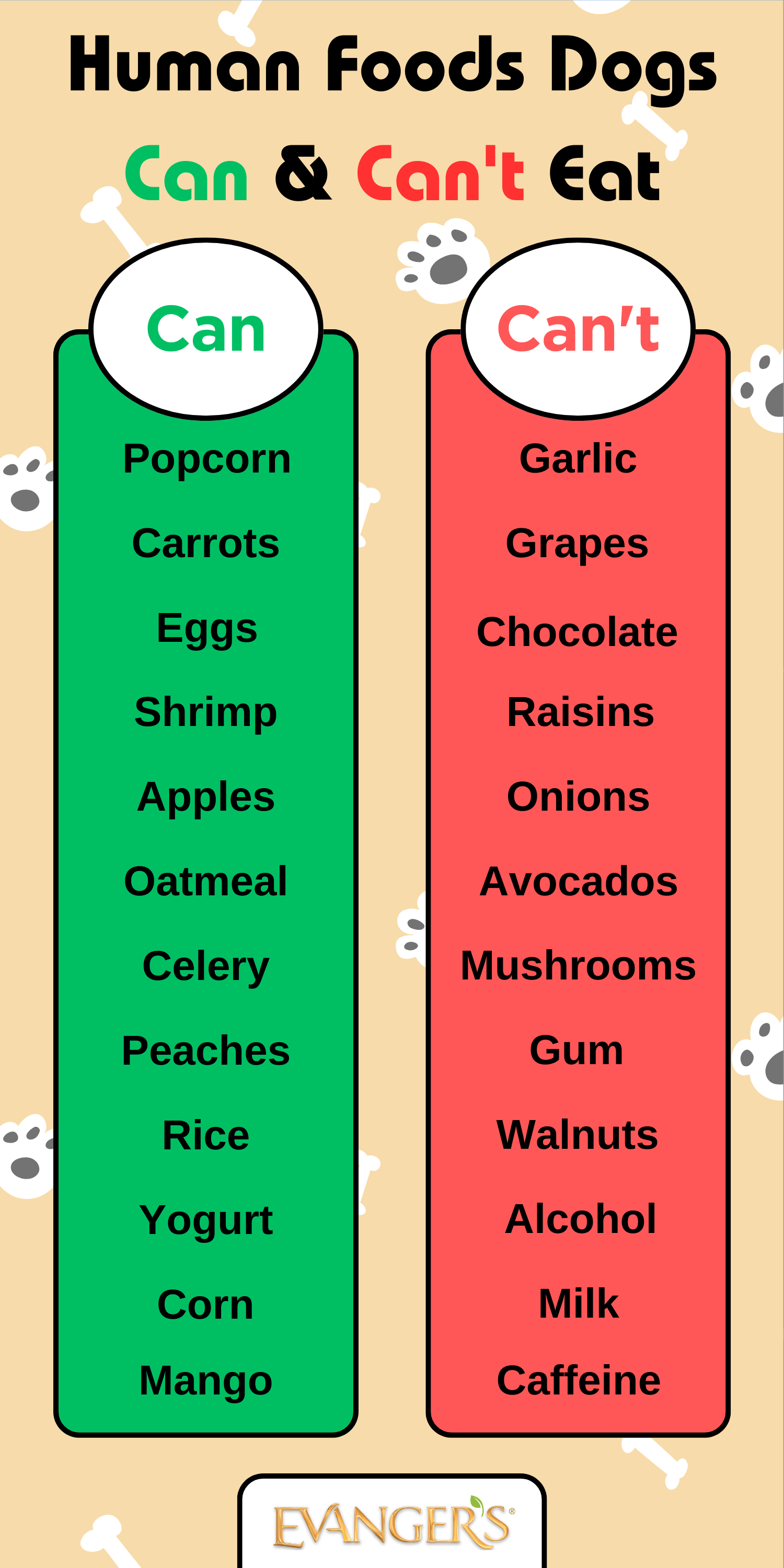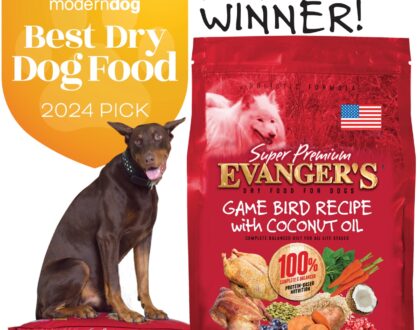Human Foods Dogs Can & Can’t Eat

by Ian Germann
Considered man’s best friend, many pet owners want to share food with their dogs. There’s nothing wrong with this action at all, but it’s important to know that not all human foods are safe for our canine friends to eat. In fact, some human foods can be very dangerous for dogs to consume. Here, we’ll take a look at a plethora of human foods dogs can and can’t eat.
Human Food Dogs CAN Eat
Popcorn – Popcorn, especially if air-popped and unsalted, can be a great, low-calorie snack for dogs that’s also high in fiber.
Carrots – Carrots are rich in essential nutrients such as vitamins A, C, and K, as well as potassium and fiber. These nutrients support various aspects of a dog’s health, including vision, immune function, skin & coat health and digestion.
Eggs – Eggs can be a highly beneficial addition to a dog’s diet when prepared properly. Eggs are a complete source of protein healthy fats, with healthy omega-3 and omega-6 fatty acids, which are beneficial for a dog’s skin and coat health.
Evanger’s Complements All Fresh Vegetarian Dinner comes with peas, carrots, potatoes, blueberries and dried eggs for a healthy choice that’s perfect for pets susceptible to food allergies.
Shrimp – If properly cooked and served plain without any seasonings or additives, shrimp can be a good, low-fat source of protein and omega-3 fatty acids for dogs.
Apples – Apples are a good source of dietary fiber, both soluble and insoluble. Apples also have a high water content, which can contribute to hydration in dogs.
Oatmeal – Oatmeal is a nutritious grain that’s rich in dietary fiber and various essential nutrients. Oatmeal is also generally well-tolerated by dogs and considered to be hypoallergenic for many.
Celery – A low-calorie vegetable with a high water and fiber content, celery contains various vitamins and minerals that are beneficial for a dog’s overall health such as vitamin K, vitamin C, potassium,and folate.
Peaches – Peaches are a good source of vitamins A and C, which are essential for a dog’s immune system, vision, and overall health. They also contain minerals like potassium, which is important for proper muscle function and maintaining healthy blood pressure.
Rice – Rice is an amazing human food options for dogs because of how easily digestible and mixable it is with other food. It may not be complicated, but it’s bland taste is perfect for dogs with sensitive stomachs, and it provides pups with a good source of energy that’s naturally gluten free
Evanger’s Heritage Classic Lamb & Rice Dinner is the perfect dinner for dogs of all life stages, with locally sourced ingredients that are sure to taste good and be easy for your dog to digest.
Yogurt – Feeding your pup plain and unflavored yogurt can be a great source of probiotics, calcium and protein.
Corn – Corn is a common ingredient found in many commercial dog foods and can also be offered to dogs as a treat or in cooked form. It’s a reliable source of energy with fiber and antioxidants that’s vary palateable.
Mango – Mango is a delicious tropical fruit that offers several advantages for dogs such as fiber, vitamins & minerals, hydration and antioxidants.
Pineapple– Along with other benefits, pineapple contains an enzyme called bromelain, which has anti-inflammatory properties and aids in digestion.
Green Beans – This nutritious vegetable comes packed with fiber, vitamins and minerals. They can also act as a natural toothbrush for dogs, with their firm texture helping scrape away plaque and tartar buildup on the teeth, promoting dental health.
Cheese – If served in moderation, cheese can be a great source of high-quality protein, as well as natural calcium and phosphorus, which are important minerals for bone health and development.
Human Food Dogs CAN’T Eat
Garlic – When dogs ingest garlic, it can cause damage to their red blood cells, leading to a condition called hemolytic anemia. Hemolytic anemia is characterized by the destruction of red blood cells, which can result in symptoms such as weakness, lethargy, pale gums, and an increased heart rate. In severe cases, it can even be life-threatening.
Grapes -The exact substance or compounds in grapes that cause toxicity in dogs is currently unknown, but even small amounts can have severe adverse effects on their health.
Chocolate – The theobromine in chocolate belongs to a group of substances called methylxanthines, and while humans can metabolize it relatively easily, dogs process it much more slowly, leading to toxic effects that can result in tachycardia, seizures, gastrointestinal issues and more.
Raisins – Just like in grapes, consumption of raisins can cause acute kidney failure.
Onions – A part of the Allium family with garlic and chives, if a dog ingests onions, it can lead to hemolytic anemia as mentioned above.
Avocados – Avocados contain a compound called persin, which can be toxic to dogs, particularly in large amounts or if the avocado is spoiled. It’s important to note that some dogs can tolerate small amounts of avocado without any problems. However, it is generally recommended to err on the side of caution and avoid feeding avocados to dogs altogether.
Mushrooms – Dogs should generally avoid eating mushrooms, especially wild mushrooms, due to the potential risk of toxicity, difficulty of identification and possibility of allergic reactions.
Gum – Dogs should not eat gum as it often contains xylitol, an artificial sweetener that can be highly toxic, causing a rapid release of insulin in dogs, leading to a dangerous drop in blood sugar levels
Walnuts – While not considered highly toxic for dogs, owners should avoid feeding their pup walnuts as they come with a significantly high fat content that can cause a plethora of digestive issues. Walnuts can also pose a choking hazard for dogs, with their size and shape making them difficult to swallow.
Alcohol – Alcohol affects dogs differently than it affects humans due to their smaller size and different metabolism. Alcohol is rapidly absorbed into a dog’s bloodstream, leading to a range of harmful effects on their body. Even a small amount of alcohol can be dangerous for dogs, causing alcohol poisoning. Dogs’ livers are also not equipped to metabolize alcohol effectively, potentially leading to liver failure and other complications.
Milk – Many adult dogs have reduced levels of the enzyme lactase, which is responsible for breaking down lactose in milk. Without sufficient lactase, dogs cannot properly digest lactose, leading to gastrointestinal issues such as diarrhea, gas, bloating and am stomach upset.
Caffeine – Dogs metabolize caffeine more slowly than humans, which means it stays in their system longer and can build up to toxic levels. The toxic effects of caffeine can include vomiting, diarrhea, excessive thirst and urination, panting, muscle tremors, elevated body temperature, and even death.
Fat Trimmings – While small amounts of fat in a dog’s diet are generally acceptable and necessary for their health, feeding them fat trimmings or fatty foods can lead to various health issues such as pancreatitis, digestive issues and obesity
Potato Skins – While cooked potatoes without the skin can be a part of a dog’s diet in moderation, it’s best to avoid feeding them potato skins altogether. Potato skins are tough and can be difficult for dogs to digest properly, potentially causing gastrointestinal upset
Rhubarb – Rhubarb leaves contain high levels of oxalic acid, a toxic compound. When ingested, oxalic acid can bind with calcium in the body, leading to the formation of calcium oxalate crystals. These crystals can cause kidney damage, kidney stones, and urinary issues in dogs.
Recommended Posts

What to Feed a Dog with Hip Dysplasia
August 21, 2023

Nutritional Tips for Boxers
August 15, 2023



